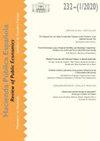影子经济与民族文化:一个空间视角
IF 0.5
4区 经济学
Q3 ECONOMICS
Hacienda Publica Espanola-Review of Public Economics
Pub Date : 2020-03-01
DOI:10.7866/hpe-rpe.20.1.3
引用次数: 4
摘要
本文试图为影子经济中参与因素的现有估计提供经验证据。这些估计数对应于1999-2015年期间,样本为82个国家。本文考察了霍夫斯泰德文化变量以及其他社会经济因素对影子经济的影响,并将空间变量作为一个额外的解释变量。作为一种新颖性进行的估计使用了包含空间滤波器技术的面板模型。我们的研究证实,民族文化和一个国家的发达程度是解释影子经济不同水平的重要因素。本文章由计算机程序翻译,如有差异,请以英文原文为准。
Shadow economy and national culture: A spatial approach
This paper seeks to contribute to the empirical evidence on existing estimations of the factors partici¬pating in shadow economy. The estimations correspond to the period 1999-2015, with a sample of 82 countries. The paper examines the effect of the Hofstede cultural variables, along with other socioeconomic fac¬tors on the shadow economy, and incorporates the spatial variable as an additional explanatory variable. The estimation carried out as a novelty uses a panel model that incorporates the spatial filter technique. Our study confirms that national culture and how developed a country is are significant factors in ex¬plaining the different levels of shadow economies.
求助全文
通过发布文献求助,成功后即可免费获取论文全文。
去求助
来源期刊

Hacienda Publica Espanola-Review of Public Economics
Economics, Econometrics and Finance-Finance
CiteScore
0.90
自引率
14.30%
发文量
14
期刊介绍:
Hacienda Pública Española/Review of Public Economics welcomes submissions on all areas of public economics. We seek to publish original and innovative research, applied and theoretical, related to the economic analysis of Government intervention. For example, but not exclusively: Taxation, Redistribution, Health, Education, Pensions, Governance, Fiscal Policy and Fiscal Federalism.
In addition to regular submissions, the journal welcomes submissions of:
-Survey Reviews, containing surveys of the literature regarding issues of interest in the Public Economics field;
-Policy oriented reviews, showing the current contributions of Public Economics in relation to relevant contemporary issues affecting public decision-makers in the real world (Policy Watch);
-Comments of previously published articles. Contributions to this section should be limited to a maximum of 2 000 words (12 pages). If deemed adequate, the authors of the commented article will be given the opportunity to react in a Reply. Both Comment and Reply will be published together.
Articles for the Survey Reviews and Policy Watch section are subject to the same double blind reviwing procedure. The adequacy of Comments submitted for publication will be evaluated by the Executive Editors.
 求助内容:
求助内容: 应助结果提醒方式:
应助结果提醒方式:


